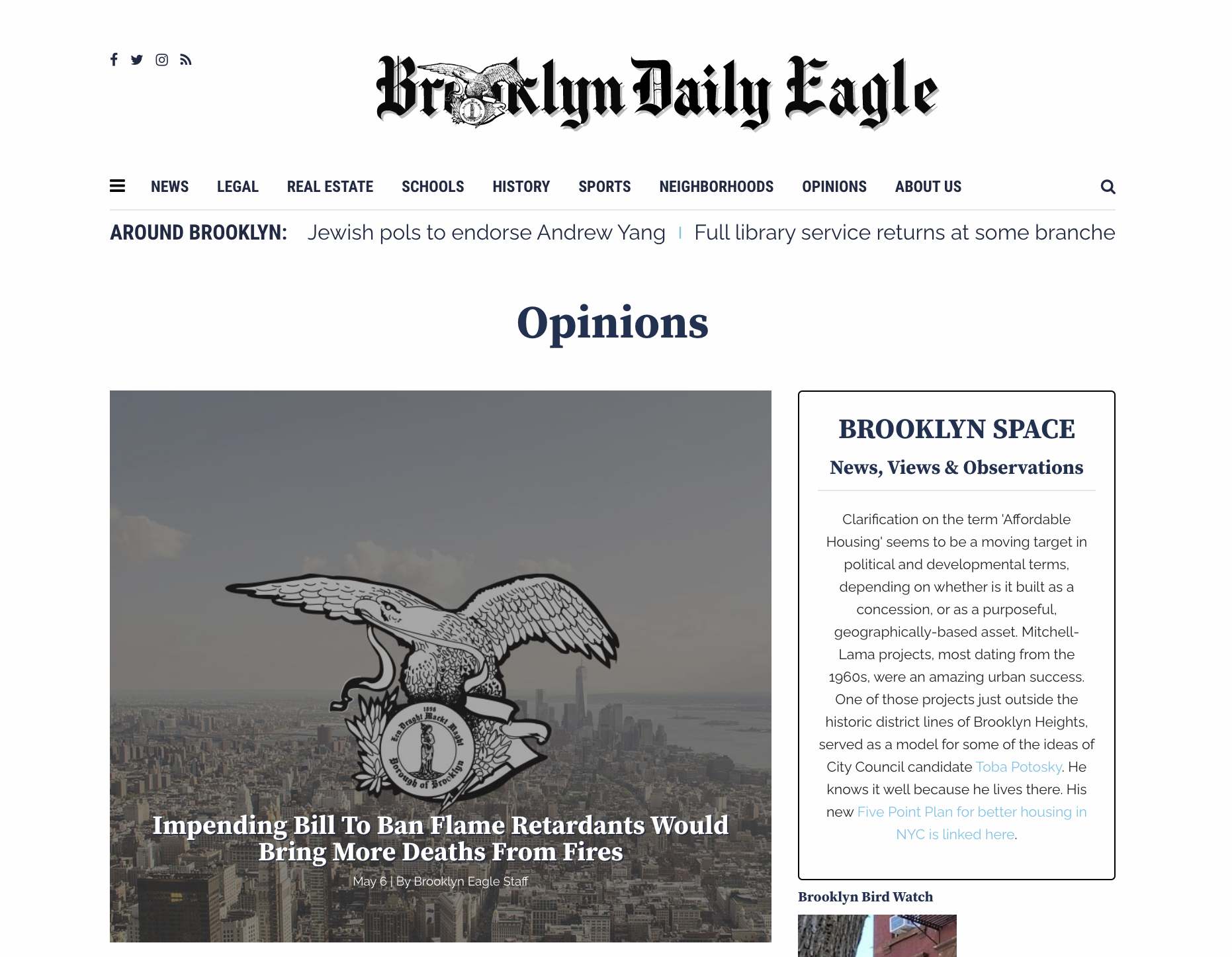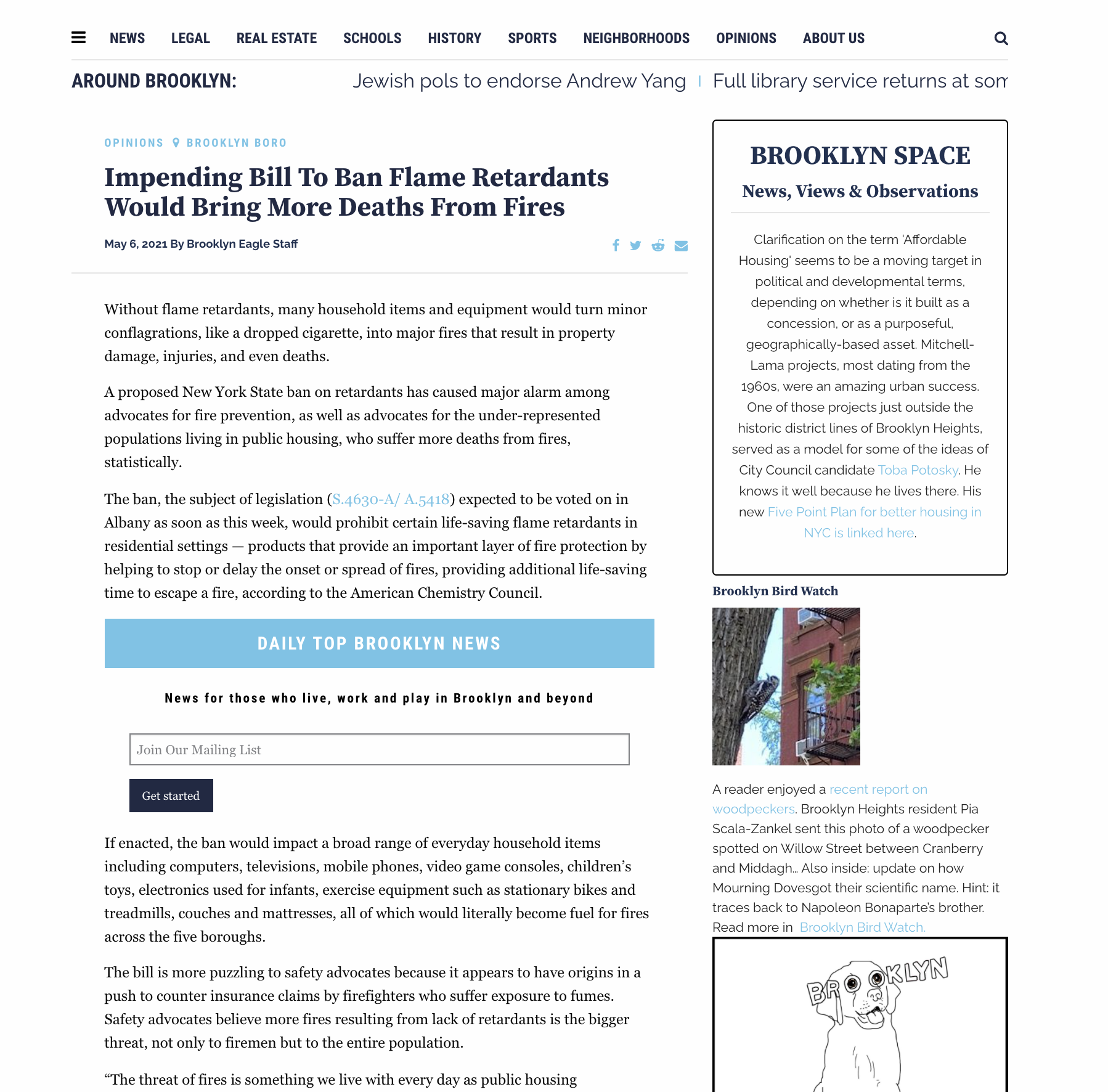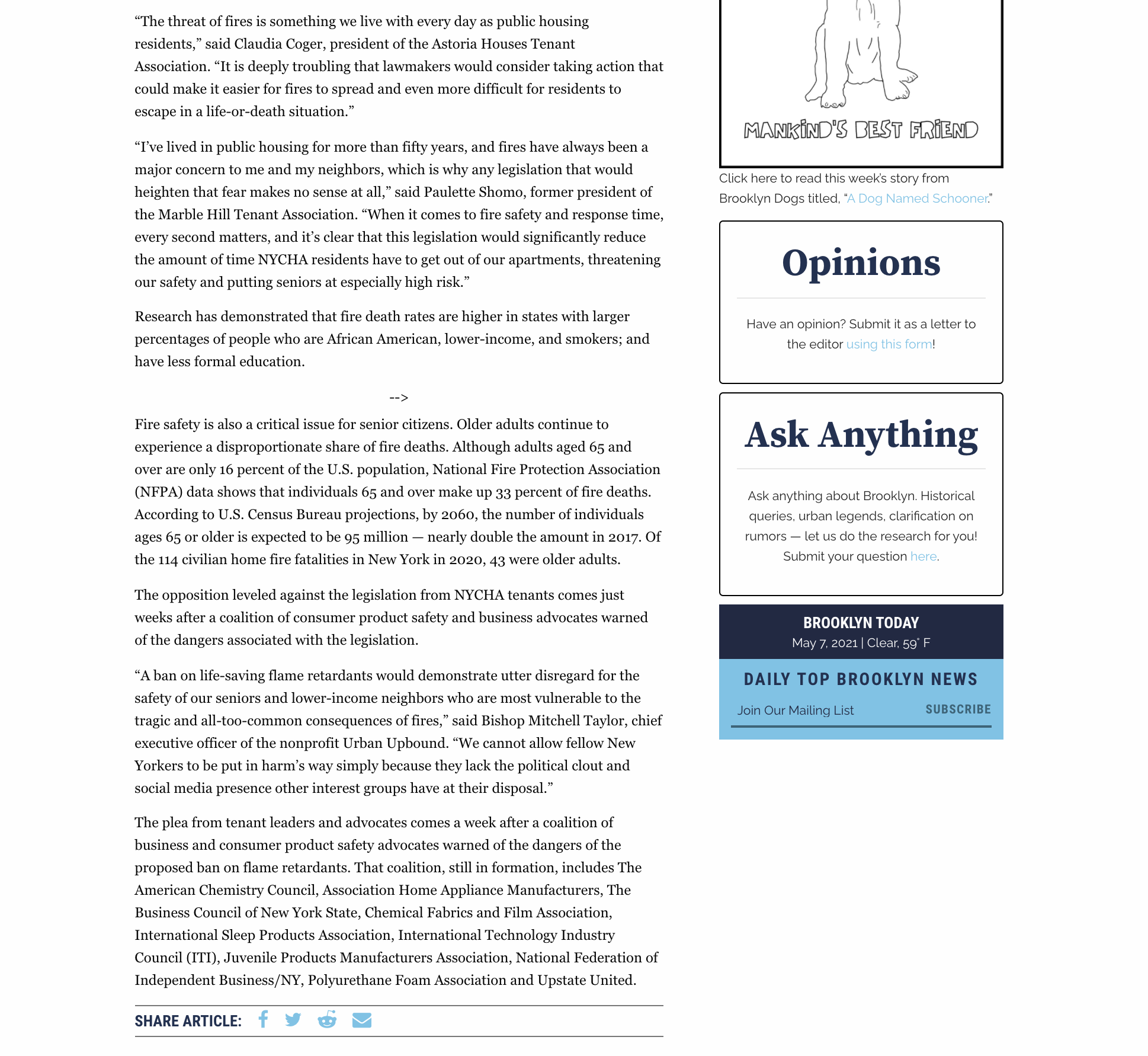The American Chemistry Council is waging an intense lobbying campaign against a bill currently moving through the state Legislature that would ban the use of toxic flame retardants in furniture and electronic screens.
Through a public relations firm, the chemicals industry has placed at least two articles in local outlets that were not identified as being primarily written by lobbyists. Those articles included a comment in opposition to the bill from a Black tenant organizer who told New York Focus that she never gave the quote to a journalist.
Public health groups have long lobbied against the use of flame retardants in household objects, arguing that they leach out into air and dust and have harmful health effects – and that many do not actually provide fire safety benefits.
If the bill is enacted, New York would follow states such as Maryland and California in phasing out flame retardant chemicals used in furniture and mattress foam, and would become the first state to phase out organohalogen flame retardant chemicals in electronic display casings and stands. In 2019, the European Union banned those chemicals, which are commonly found in TVs and computer monitors.
As the bill, sponsored in the state Senate by Todd Kaminsky, a Democrat from Long Island, has gained traction this legislative session, a coalition of trade groups including the American Chemistry Council, the Association for Home Appliance Manufacturers, and the National Federation of Independent Businesses has raised concerns about phasing out flame retardants.
“Without the use of flame retardants, the danger of fire spreading quickly in densely populated housing communities would increase,” industry groups wrote in a letter to legislators late last month. The letter emphasizes that banning flame retardants would endanger New York’s “most vulnerable communities.”
But environmental groups, consumer advocates and medical experts have published findings in peer-reviewed journals showing that many carcinogenic flame retardants do little to stem fire. A study by the Consumer Product Safety Commission found that “fire-retardant foams did not offer a practically significantly greater level of open flame safety than did the untreated foams.”
Flame retardants tend to be embedded in household items at levels high enough to pose health risks, but low enough that they don’t stop objects from burning, according to a Chicago Tribune investigation from 2012.
First promoted for widespread use by the tobacco industry, which was in the 1980s seeking a solution to cigarette-started fires, flame retardants are now a major market for chemical producers. According to the American Chemistry Council, which represents clients such as Dupont, Exxon, and Dow Chemical, chemicals are the third-largest manufacturing industry in New York state.
Now, the industry is fighting to protect that lucrative market.
Lobbyists from the American Chemistry Council circulated a memo opposing the bill in the weeks leading up to the vote, according to environmental lobbyists. A sponsor of the bill who spoke on condition of anonymity said their office received calls while other legislators received texts from chemical industry lobbyists opposed to the bill. Those lobbying strategies are hardly unusual—but what is less common is the aggressive media strategy employed by lobbying firms hired by the chemicals industry.
Chemicals lobby’s media strategy

A public relations firm retained by American Chemicals Council successfully planted stories in two New York media outlets. The Brooklyn Daily Eagle, a local newsroom, published a story on May 6, under the author byline “Brooklyn Eagle Staff,” describing the chemicals lobby’s claims.
The article, which was the lead story in the paper’s online opinion section for more than a week, repeats arguments made by trade groups in their private letter to elected officials and in direct outreach to legislators. It was removed from the website, with no editor’s note, after New York Focus reached out for comment on May 17. A saved version of the story can be read here.
“One of our contributors was apparently duped by a source,” Francesca Tate, assistant to the publisher, wrote in an email. “A freelancer whom we are no longer using contributed the story. Identifying the freelancer as a staff writer was an error.” The Eagle was not paid to publish the story, she said.
Another article by news reporter Bill Parry was published by local Queens paper QNS on May 7. The text of the two articles is identical in some sections, and both use the same quotes. Parry found most of the information in his story from a press release from Marino Public Relations, he said.
The article at the Eagle quoted comments from two Black women, leaders in Queens public housing tenant organizing, describing their opposition to a ban on flame retardants.
“The threat of fires is something we live with every day as public housing residents,” both articles quote Astoria Houses Tenant Association President Claudia Coger saying. “It is deeply troubling that lawmakers would consider taking action that could make it easier for fires to spread and even more difficult for residents to escape in a life-or-death situation.”

But reached by phone on May 7, Coger said that she has not commented on flame retardants and has no memory of talking about the issue with anyone. “I don't know where that quote came from,” Coger said. “I don't remember having a discussion about this.”
Asked what she thought of the legislation, Coger said she would need more information in order to form an opinion, but that her gut reaction was to be skeptical of flame retardants. “I just have a feeling that it doesn’t protect our children – all the gadgets, and not being sure of what’s inside of them,” she said.
After Coger denied speaking to anyone about the issue, New York Focus reached out to Marino for comment. Tom Corsillo, a senior vice president at Marino, confirmed that the firm is representing the American Chemicals Council on the flame retardants.
“It sounds like your initial call and/or questions caught her off guard. You can call her back if you'd like to confirm,” Corsillo wrote in a text message. “She provided a statement, so it's accurate that she did not speak to a journalist about this.”
Reached for a second time on May 19, Coger maintained that she had never provided a statement on the bill to Marino or any lobbyist or journalist. Instead, she said, the quote was likely provided by Bishop Mitchell Taylor, the pastor of Urban Upbound, a nonprofit serving New York City Housing Authority residents. Coger has an ongoing agreement with Taylor that she can be quoted without being notified, she said.

“I work with Bishop Mitchell G. Taylor on a lot of things, and he has my permission, when we have discussions or whatever, to follow up with my quote. That’s where the article came from,” she said. Asked to point to other articles that have quoted her using comments written by Taylor in the past, Coger said, “I don’t really know, I can’t give you that information, because I don’t remember all of that stuff.”
Coger declined to provide contact information for Taylor or Urban Upbound.
Asked whether anyone at Marino spoke with Coger before providing a statement on her behalf, Corsillo wrote, “I'm not going to get into the minutae (sic) and minute-by-minute play-by-play of interactions with people who are opposed to banning life-saving flame retardants and chose to voice that opposition.”
When Coger was reached for the second time, she had revised her stance on flame retardants, downplaying concerns she had voiced earlier about risks they may pose to children’s health.
Asked whether she was still worried that the chemicals may cause asthma, Coger said, “Actually, I would say no. Because I’ve been in public housing for 68 years, and I raised my family there. And I have seven children who never had asthma. My neighbors did not have asthma.”
Paulette Shomo, former president of Marble Hill Tenant Association, was also quoted in the Brooklyn Eagle article suggesting that phasing out fire retardants could threaten tenants’ safety.
Corsillo originally said that he could make Shomo available for comment, but was not able to make her available for more than a week prior to this article’s publication. Corsillo declined to provide her phone number.
New York Focus was unable to independently reach Shomo or Bishop Mitchell Taylor of Urban Upbound, who is also quoted in the Eagle and QNS stories. The American Chemistry Council said in a statement, "All individuals quoted within the press release have approved and authorized for distribution all statements attributed to them.”
Professional and volunteer firefighters’ associations have been leading supporters of the legislation, citing higher occupational risk posed by carcinogenic flame retardant chemicals when they combust.
“Decades ago, it was a badge of honor to have dirty gear. You were called ‘salty’ – it showed you were an experienced firefighter. That’s not the case anymore – we know, scientifically, that all the stuff we used to see as a badge of honor was actually harmful, and in some cases deadly,” said John D’Alessandro, secretary for the Firemen's Association of the State of New York.
The American Chemistry Council argues that the chemicals have not been proven to make firefighters sick. “The National Institute of Occupational Health and Safety (NIOSH) has studied over 30,000 career firefighters to examine their risk for cancer, as well as other causes of death due to job exposures.... No causal connection from exposure to flame retardants was made,” the group said.
“What capitalism does is it pits working-class and marginalized people against each other. In this case, tenant organizers in public housing against working-class firefighters. That’s a disgusting thing to do on the part of the lobbyists who are doing this, and also it’s a false choice, because I think obviously we should just look for fire retardants that are not carcinogenic,” said Jabari Brisport, a state senator from Brooklyn who co-sponsors the bill.
“Toxic but unnecessary”
“Research has demonstrated that fire death rates are higher in states with larger percentages of people who are African American, lower-income, and smokers; and have less formal education,” the Brooklyn Eagle and QNS articles both read.
Public health advocates say this sort of messaging is misleading, since it implies that banning flame retardants would lead to more home fires.
In its study of upholstered furniture, the Consumer Product Safety Commission found that fire-retardant foams do not provide greater fire safety than untreated foam. That’s partly because flame-retardant foam is buried deep within furniture, offering little protection when furniture wrapping, often made of highly flammable fabric, catches fire. Ordinary polyester, placed between the foam cushion and cover fabric, was far more effective in the trial at preventing fire than chemical-laden flame-proof foam.
Many flame retardants have been linked to cancers, impeded child brain development, and reproductive harms, according to the National Institutes of Health’s summary of several peer-reviewed studies.
The American Chemistry Council said those findings only apply to some substances, and it said that all the substances in question have been tested and approved by federal regulators. “In terms of overall health, many of the referenced studies and concerns are based on a small subset of older substances,” the group said in a statement. “These claims simply do not apply to all flame retardant products.”
Since flame retardants are additives in the production process – not molecularly bonded with the material in a mattress or chair – they more frequently rub off, leading to high incidence in household dust, said Kenneth Spaeth, a board-certified physician at Northwell Health who specializes in occupational and environmental medicine.
Toddlers, who crawl on the floor and play on furniture, often putting dusty objects in their mouths, typically have higher concentrations of flame retardants in their bodies than adults.
A study of 80 toddlers in North Carolina found PBDE flame retardants in 100% of the tested children’s blood samples. The level of chemicals present in the toddlers’ blood was strongly, negatively associated with the parents’ level of education. Another study found that individuals in households earning under $20,000 per year had significantly higher “body burdens,” or levels of flame retardants present in their blood.
Toxic flame retardants have been shown to be present at higher levels in the bodies of Mexican American and Black children than white children.
Despite the disproportionate burden of flame retardants on poor and non-white communities, the chemicals lobby has attempted to create the appearance of support from vulnerable groups in opposing bans on flame retardants, in what the Los Angeles Times called a “fake grass-roots” strategy.
“This pseudo-campaign shows the chemical industry’s desperation around this bill,” said Eve Gartner, managing attorney with environmental law firm EarthJustice’s toxics program. Gartner argued the industry wants to “ensure an ongoing market for their toxic but unnecessary chemicals.”
“The chemical industry has a well-documented history of distorting the evidence on toxic flame retardants,” said Rich Schrader, an Albany lobbyist with the Natural Resources Defense Council, which has spearheaded environmentalists’ push for the legislation. “This is a playbook – we’ve seen them do this over and over again.”
Correction: Rich Schrader works at the Natural Resources Defense Council.


